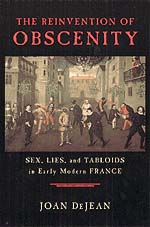
The Reinvention of Obscenity casts a fresh light on the mythical link between sexual impropriety and things French. Exploring the complicity between censorship, print culture, and obscenity, DeJean argues that mass market printing and the first modern censorial machinery came into being at the very moment that obscenity was being reinvented—that is, transformed from a minor literary phenomenon into a threat to society. DeJean's principal case in this study is the career of Moliére, who cannily exploited the new link between indecency and female genitalia to found his career as a print author; the enormous scandal which followed his play L'école des femmes made him the first modern writer to have his sex life dissected in the press.
Keenly alert to parallels with the currency of obscenity in contemporary America, The Reinvention of Obscenity will concern not only scholars of French history, but anyone interested in the intertwined histories of sex, publishing, and censorship.

Television, Tabloids, and Tears was first published in 1995. Minnesota Archive Editions uses digital technology to make long-unavailable books once again accessible, and are published unaltered from the original University of Minnesota Press editions.
"I am Biberkopf," Rainer Werner Fassbinder declared, aligning himself with the protagonist of his widely seen television adaptation of Berlin Alexanderplatz. The statement provoked an unprecedented national debate about what constituted an acceptable German artist and who has the power to determine art. More than any recent German director, Fassbinder embodied this debate, and Jane Shattuc shows us how much this can tell us, not just about the man and his work, but also about the state of "culture" in Germany.
It is fascinating in itself that Fassbinder, a highly controversial public figure, was chosen to direct Berlin Alexanderplatz, Germany's longest, costliest, and most widely viewed television drama. Shattuc exposes the dichotomy of institutional support for this project versus the scandalous controversial reputation of Fassbinder as a gay man who flaunted his sexuality and involvement with drugs.
Fassbinder built his reputation on two separate images of the director-the faithful adapter and the underground star; with Berlin Alexanderplatz these two identities came together explosively. Tracing the two artistic paths that led Fassbinder to this moment, Shattuc offers us a look at cultural class divisions in Germany. Her account of Fassbinder's history as an Autor reveals both the triumph and the failure of bourgeois cultural domination in postwar West Germany.
READERS
Browse our collection.
PUBLISHERS
See BiblioVault's publisher services.
STUDENT SERVICES
Files for college accessibility offices.
UChicago Accessibility Resources
home | accessibility | search | about | contact us
BiblioVault ® 2001 - 2024
The University of Chicago Press









